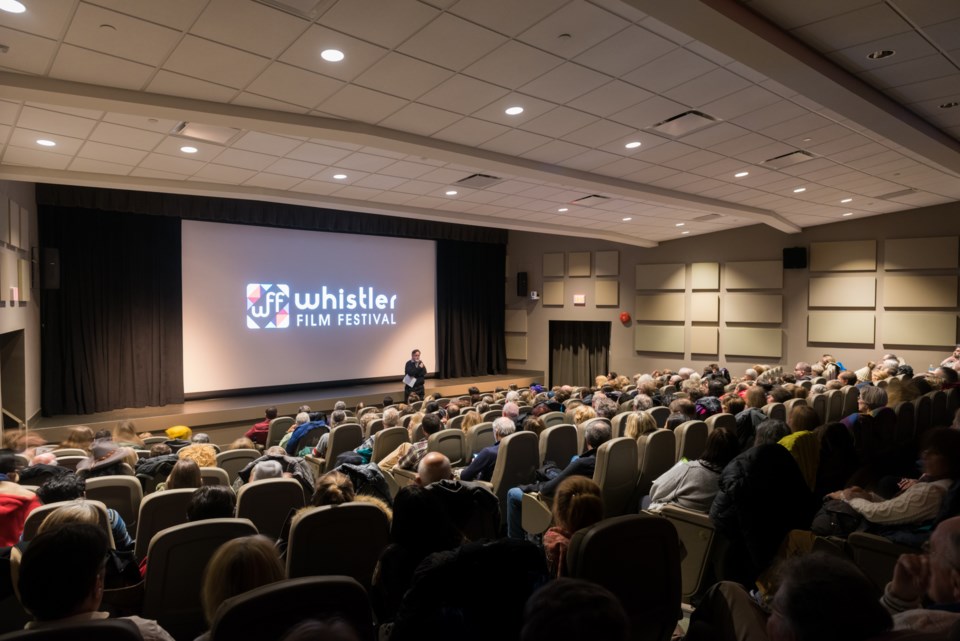The 2021 instalment of the Whistler Film Festival was marked by significant wins but also, once again, marred by challenges.
While the festival attracted 14,085 attendees across all of its programming—which included online and in-person films—and saw revenues of $1.9 million, it also had to contend with an ongoing pandemic, as well as major flooding closing highways and impacting shipping.
Those were just a few of the highlights from the Whistler Film Festival Society’s (WFFS) annual general meeting, held online on Wednesday, Aug. 24.
“It was our 21st year of operation and it was definitely another one that kept us on our toes as we delivered essentially what was one-and-a-half festivals by doing a hybrid online and in-person event,” said Angela Heck, executive director of the WFFS. “We’ve learned a lot through the 2020 online edition and couple that with our previous history of a solid in-person program, we married the two together and made some significant changes to the way we designed and delivered the film and industry programming through our talent programs and our 365-degree, year-round programming, all the while living up to our reputation as Canada’s coolest film festival.”
Attendance was up slightly from 2020, with about 73 per cent of attendees, both online and in-person, hailing from British Columbia.
“We had 21.5 per cent originating from elsewhere in Canada, and with our industry talent talks and event programming accessible at an international level, we attracted even more viewers from around the globe, including attendance from the U.S., U.K., Germany, Mexico, France, Australia, South Africa, and even Malta.”
The content summit, meanwhile, attracted 1,110 attendees and 149 industry leaders over its 10-day run.
WFFS saw revenues of $1,906,165 and expenses of $1,702,295, amounting to a $203,870 surplus for the year.
“Overall revenue increased significantly from the previous year which is understandable as it was an online-only year and cash revenue correspondingly increased to reflect this hybrid event,” Heck said. “This included an increase in grants, which reflected new grant opportunities, and sponsorships also increased dramatically, signalling a relative return to normalcy and an interest in live events.”
In addition, government programs helped soften the impact of the pandemic, Heck added.
Corporate sponsorships also increased to $1.7 million in 2021, up from $1.2 million in 2020, accounting for 45 per cent of the total revenue, including 21-per-cent cash and 24-per-cent in-kind contributions.
Public support, meanwhile, accounted for 41 per cent, up from 20 per cent in 2020, while earned revenue was 10 per cent.
“We secured a total of 80 sponsors and funders, which was up from 73 in 2020,” Heck said. “We were fortunate enough to secure several new sponsors in 2021 … We benefited greatly from our community of supporters and an aggressive fundraising and restructuring campaign over the past three years to address some legacy debt. This effort has allowed the organization to accept access to new investments for our programs and helped us to stabilize year-round operations.”
The WFFS also added new board members during the meeting. They include: Tracey Friesen, managing vice president of the BC Producers Branch, CMPA; Karla Laird, director, member services and communications for UBCP/ ACTRA; Kerry Moraes-Suguiyama, executive in charge of Indigenous Language Production, APTN; and Steven Thibault, COO, BRON Media Corporation. They join: Susan Brouse, Ann Chiasson, Roger Soane, Daniel Cruz, Shauna Hardy, Nathaniel Lyman, and Rob Larson.
The organization also recently hired Erin Mussolum as manager of operations.
Looking ahead, Heck announced the 2022 event would remain hybrid online and in-person, set to run Nov. 30 to Dec. 4 in Whistler and online from Dec. 5 to Jan. 2, 2023.
“Overall, at the end of our fiscal year, our financial position is much stronger and we really look forward to sharing announcements for the upcoming year very shortly,” she said.




